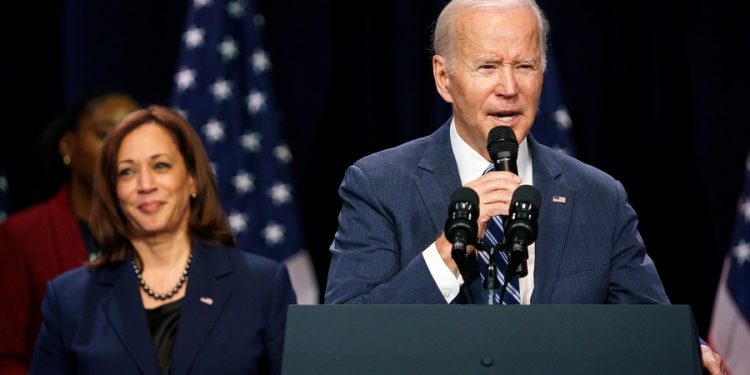Rest in peace to a true legend. Voice actor Kevin Conroy, who brought Batman to life on the small screen for generations of comic book fans, has died at the age of 66.
Today in health, we look at President Biden’s reaction to Democrats’ better-than-expected election night and the health care issue he’s crediting for getting women to the polls.
Welcome to Overnight Health Care, where we’re following the latest moves on policy and news affecting your health. For The Hill, we’re Nathaniel Weixel and Joseph Choi. Someone forward you this newsletter?
Biden credits the ‘power of women’ in midterms
President Biden on Thursday said that he thinks that people who support denying access to abortions now know the power of women in America following the midterm elections this week.
“You all showed up and beat the hell out of them,” Biden said in remarks to the Democratic National Committee at Washington, D.C.’s Howard Theatre. “Those who support ripping away the rights to choose don’t have a clue about the power of women in America but now I think they do.”
“As I’ve said, women in America made their voices heard, man,” he said.
The president said that “one of the most extraordinary things” about the Supreme Court’s summer decision to overturn the Roe v. Wade decision was that it mobilized women to vote.
Vice President Harris, first lady Jill Biden, and second gentleman Doug Emhoff joined the president on stage, along with dozens of people wearing shirts and holding signs with “Let’s Go, Joe,” “Fetterman” and “End Citizens United.”
“This is not a political piece, this is to say thank you, thank you, thank you,” said Biden. “Tuesday was a good day for America, a good day for democracy, and a strong night for Democrats.”
Read more here.
Juul to avoid bankruptcy, laying off hundreds
Electronic cigarette company Juul Labs Inc. has found a way to avoid bankruptcy through a cash infusion from its early investors, with the new plan involving a round of layoffs.
“Today, Juul Labs has identified a path forward, enabled by an investment of capital from some of our earliest investors. This investment will allow Juul Labs to maintain business operations, continue advancing its administrative appeal of the FDA’s marketing denial order and support product innovation and science generation,” a Juul spokesperson said in a statement provided to The Hill.
As the company’s spokesperson noted in their statement, the Food and Drug Administration (FDA) briefly banned the sale and marketing of Juul’s e-cigarettes over the summer as part of the agency’s efforts to tamp down on youth vaping.
The FDA’s ban on Juul’s products was lifted shortly after it was issued due to “scientific issues” that warranted “additional review.”
“To further secure the company’s ability to continue moving forward, we are also undertaking a reorganization, including the difficult but necessary step of separating from many valued colleagues,” added the Juul spokesperson.
This is the latest development in what has been a fiscally and legally tumultuous year for Juul. It was reported last month that the company had canceled plans to expand outside the United States.
Read more here.
STUDY DETAILS WORSENING RACIAL DISPARITIES IN OPIOID ADDICTION TREATMENT
Black and Hispanic patients with opioid use disorder complete shorter durations of buprenorphine treatment compared with white patients, while the disparity has widened in recent years, according to results of a new study.
Although treatment duration among white patients increased beginning in 2017, in 2014 it consistently decreased among Black patients. In 2009, it began decreasing among Hispanic patients.
Buprenorphine is a drug commonly prescribed to patients with opioid use disorder.
Although a longer duration of treatment is associated with better outcomes, data show racial and ethnic minority patients are less likely to take the drug for the recommended amount of time compared with white patients.
Inequities in “access to education, employment, and medical care, could affect substance use treatment initiation, engagement, and outcomes,” authors wrote.
Read more here.
BREAST CANCER VACCINE SHOWS PROMISE IN EARLY TRIAL
An experimental breast cancer vaccine has been shown to safely generate anti-tumor immunity in patients with advanced stages of the disease.
Data from the phase I trial conducted at the University of Washington School of Medicine indicate the vaccine could one day be used to treat different kinds of breast cancer.
“Because this was not a randomized clinical trial, the results should be considered preliminary, but the findings are promising enough that the vaccine will now be evaluated in a larger, randomized clinical trial,” said lead investigator Mary L. Disis, a professor of medicine at the University of Washington and director of the Cancer Vaccine Institute, in a statement.
The vaccine was developed to specifically target the human epidermal growth factor receptor 2 (HER2) protein. High levels of the HER2 protein — which helps cancer cells grow more quickly — are present in around 15 to 20 percent of breast tumors, with such cases tending to be more aggressive and are more likely to recur after patients undergo treatment.
A precarious paradox: However, the overproduction of HER2 can also trigger cytotoxic — or cell-killing — immunity. Patients who have this type of immune reaction are less likely to have their cancer recur and tend to have longer overall survival than those without the reaction.
Read more here.
Cancer Moonshot coordinator touts advancements
White House Cancer Moonshot Coordinator Danielle Carnival touted a series of recent medical breakthroughs at a recent The Hill event, while laying out the ambitious goals of the program in the coming decades.
“The exciting thing is we have so many more tools today than we had even a couple of decades ago,” Carnival said at the Health Care Innovations event last month. “We have a vaccine that prevents the cause of up to seven types of cancer in the HPV vaccine.”
A study in The Lancet found rates of cervical cancer were 87 percent lower among women in their 20s who received the vaccination between the ages of 12 and 13 when compared with unvaccinated women.
“If we had widespread uptake of that vaccine we could eliminate cervical cancer, we could take an entire cancer pretty much off the map,” Carnival said.
Administration agenda: During the event sponsored by Hologic, Carnival also laid out some of the goals for the Cancer Moonshot, which President Biden restarted after taking office.
The overarching goal is to decrease the death rate from cancer by at least 50 percent over the next 25 years.
Carnival said she and her colleagues also hope to lead joint public-private efforts to close the cancer screening gap, understand and address toxic and environmental exposures, drive innovation, decrease the impact of preventable cancers, and support cancer patients and their families.
Read more here.
WHAT WE’RE READING
Many patients with weak immune systems don’t realize their Covid-19 medicine isn’t as effective as it used to be (CNN)
‘Impending intergenerational crisis’: Americans with disabilities lack long-term care plans (Kaiser Health News)
COVID variants BQ.1/BQ.1.1 make up 44% of U.S. cases – CDC (Reuters)
STATE BY STATE
Michigan children’s hospital says it’s 100% full due to RSV surge (ABC News)
Colorado just legalized ‘magic mushrooms,’ an idea that’s growing nationwide (NBC News)
Supreme Court races offer anti-abortion groups a win on a tough night (Politico)
That’s it for today, thanks for reading. Check out The Hill’s Health Care page for the latest news and coverage. See you next week.















